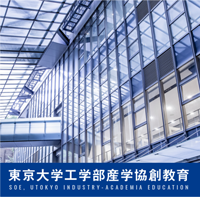Design
Index
Design
Department of Civil Engineering
Design in civil engineering ranges from individual facilities and public spaces to social systems. What people have in common is living their normal lives on a daily basis while at the same time facing a crisis (large-scale natural disaster or incident) every few decades. The study of civil engineering primarily addresses urban spaces (streets and parks), transportation (railways and highways), riparian environments (rivers, coasts) that are desired for enriching daily with functionality, comfort and beauty. At the same time, it is vital that the lives of citizens be tenaciously protected at a moment’s notice when a crisis arises. The design of these seemingly conflicting requirements into given structures, spaces and systems, and the creation of frameworks for municipal and regional landscapes are the features that differentiate civil engineering design from that of other fields.
Department of Architecture
Techniques for building constructions are studied in the Department of Architecture. However, technique alone cannot erect a good construction. In order to create attractive constructions and a rich environment, we must detect relevant issues, combine essential technologies, respond to various conditions and organize ideas that fit the purpose. Design refers to integrating such actions in the progressive pursuit of the form of a single construction.
“Design drawings”, done in design exercises that begin in the second semester of the second year, receive highly individualized guidance. “Diploma design” is the culmination of design study. If “design drawings” are assumed to be practical exercises in design, then “architectural design” that is studied in the fourth year is the theory of design. “Fundamental modeling” is offered in the third and fourth years as a design exercise for other related fields.
Department of Urban Engineering
Planning a city requires practice in thinking on various scales. Beginning with components like park benches, stations, schools, houses and the like that make up cities, consider the sizes of various spaces all at the same time, from a walking distance scale to an entire city, to the metropolitan region, up through the global environment. Not only is it important to thoroughly grasp the current situation, but also to have a means of focusing on the future. In order to envision a rich future, we must also learn the cumulative past of a city, or in other words, its culture.
From the second semester of the second year through the first semester of the fourth year, it is hoped that through exercises students acquire techniques for understanding, relating and reconciling various scales of space and time. Through the process of actually applying such techniques, urban design is envisaged by integrating community and municipal involvement and its legal system.
Department of Mechanical Engineering
In the Department of Mechanical Engineering, we aim to nurture talented individuals capable of comprehensively designing hardware, software, and human cognition and behavior. The wide range of subject matter covered by the Mechanical Engineering Department includes not only commonly imagined stereotypical machines, but also nanoscale devices, environmental and energy systems, medical equipment, and life support. In order to create these, it is essential to plan, or in other words, to design a manufacturing system that integrates knowledge to create new value. In order to acquire the power to design, you need experience not only in knowledge input, but also on-site in knowledge output and value creation. To that end, in addition to classes on design, the Department of Mechanical Engineering places great emphasis on creative exercises in which knowledge learned in class is used in the creation of one’s own ideas. Additionally, with respect to human cognition and behavior design, we are engaged in education and research on design to create attractive products that are safe for people, easy to use, and appealing to the five senses and sensations.
Department of Aeronautics and Astronautics
Advances in aeronautics and aerospace engineering have directly contributed to expanding the limits of human activity and knowledge. By the same token, in recent years, advances in aeronautics and aerospace engineering have been made not only in transportation, but have also become closely related to people's daily lives in combination with technologies such as telecommunications, positioning, earth observation and the like. Aeronautics and aerospace engineering is actually comprised of various specialized fields, and as well as developing advanced technologies in each field, the ability to integrate and harmonize them across the board is required in the design and realization of ultramodern hardware such as aircraft, spacecraft, artificial satellite, and propulsion systems.
Based on this recognition, this department nurtures talented individuals with
(1) the attitude to challenge undeveloped technical issues and academic fields
(2) the intelligence to understand existing knowledge and state-of-the-art technology
(3) the ability to integrate various technologies from different fields and create value
(4) the passion for exploring the sky and universe.
In other words, we strive to contribute to the development of aerospace engineering fields and related science and technology fields through the careful education on the pillar of the “promotion of system integrated abilities”.
Department of Precision Engineering
Can you plan job hunting? You will act after taking everything into account: corporate strengths, personal selling points, and the state of the world economy. You will optimize the process and maximize the effects. This is your plan and you will learn how to do it by studying design at this university.
If you would like to design your life logically, come to the Department of Precision Engineering. The Department of Precision Engineering creates useful services by constructing sensors and motors that utilize nanotechnology and microtechnology and connecting them with a network. Lacking experience with designs that enhance this new era, your ability will not be taken seriously in a competitive global society.
Education in the Department of Precision Engineering is at the forefront of CAD development, advocates general design studies, launches service engineering, and constantly emphases design as the root of power for shaping the future.
Department of Information and Communication Engineering
Electronic information technology has the innovative power to lead our daily life from its foundation towards a new dimension. The background for creating practical technology firmly incorporated into society requires not only the devices and software themselves, but also a sense of designing activities for people. Take, for example, safe and secure design. In addition to the pursuit of high-speed and high-performance, it is indispensable to design a mechanism that ensures the secure, full use of electronic information technology in a safe lifestyle setting. As well, as far as users are concerned, interactive design has an important significance in the creation of intuitive, easy to use, and convenient media. Furthermore, from commercial products through media arts, emotional design has an extremely appealing social power. Designs that permeate our lives are studied in the Department of Information and Communication Engineering.
Department of Electrical and Electronics Engineering
Department of Information and Communication Engineering
As a rule, all social objects” and “matter” based on a “principle” or “theory” will first demonstrate their abilities when a proper “design” is applied. For example, an integrated circuit, commonly used in mobile phones or the like, works with a combination of switch elements called transistors, but due to their explosive growth four times within three years, the combinations now contain nearly one billion elements. The merits and demerits of this huge number of combinations create a smart, unsmart device, and a difference in competitiveness consequently arises.
In the field of electronics and information systems, our systematic study focuses on a wide scope of fields ranging from atomic arrangement, integrated circuits, and microelectromechanical machines to future electric power systems and the global environment, ”exploring the principles lurking there”, and “design technique that bring the best results”.
Department of Mathematical Engineering and Information Physics
Pursue ‘universal principles and methodology’! These are the basis of science and technology. This is the goal of the Department of Mathematical Engineering and Information Physics. Researching this ‘universal principles and methodology’ is indivisible from research in individual fields, and in the Department of Mathematical Engineering and Information Physics research in various fields is conducted along with researching the ‘universal principles and methodology’.
Examples of research related to “design” that are conducted include optimization theory and algorithmic development, mathematical programming, experimental design, modeling, system identification, inverse problems, prediction techniques, optimum and robust control, and system integration techniques.
In the department curriculum, students acquire ‘universal principles and methodology’ basics in lectures, develop principles and methodologies through research for graduation, and engage in resolving practical issues.
Department of Chemical System Engineering
In the Department of Chemical System Engineering it is possible to analyze and control chemical phenomenon with scales from molecular to global in size, and with a focus on the systemization and design of these components, a chemical system engineering methodology can be acquired.
The most suitable chemical system design cannot be realized by optimizing individual components or the underlying technology. Taking high-performance material design as an example, it is necessary to comprehensively evaluate a variety of chemical information, including molecular level and macro level structural information, control information, contributions to the environment and substance safety. Grounded with the chemical system engineering "from molecules to the earth" view, systems are designed to resolve global environment and energy issues with chemistry as the foundation.
Department of Systems Innovation
Articles including new materials and industrial products, matters such as services operated by companies and social systems and the like have been designed, and a rich society has been built. However, environmental, energy and food issues to be resolved by modern society are complex, and the article or matter to be designed has a complex system. Under these circumstances, it is necessary to enhance abilities to execute design, as well as to strengthen the ability to solve problems with complex systems.
Articles including new materials and industrial products, matters such as services operated by companies and social systems and the like have been designed, and a rich society has been built. However, environmental, energy and food issues to be resolved by modern society are complex, and the article or matter to be designed has a complex system. Under these circumstances, it is necessary to enhance abilities to execute design, as well as to strengthen the ability to solve problems with complex systems.



